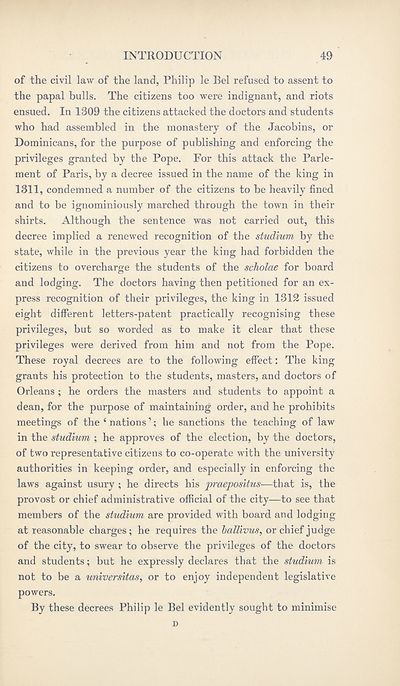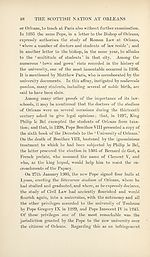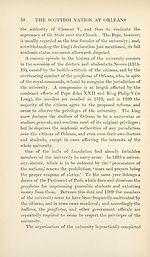Download files
Complete book:
Individual page:
Thumbnail gallery: Grid view | List view

INTRODUCTION
49
of the civil law of the land, Philip le Bel refused to assent to
the papal bulls. The citizens too were indignant, and riots
ensued. In 1309 the citizens attacked the doctors and students
who had assembled in the monastery of the Jacobins, or
Dominicans, for the purpose of publishing and enforcing the
privileges granted by the Pope. For this attack the Parle-
ment of Paris, by a decree issued in the name of the king in
1311, condemned a number of the citizens to be heavily fined
and to be ignominiously marched through the town in their
shirts. Although the sentence was not carried out, this
decree implied a renewed recognition of the studium by the
state, while in the previous year the king had forbidden the
citizens to overcharge the students of the scholae for board
and lodging. The doctors having then petitioned for an ex¬
press recognition of their privileges, the king in 1312 issued
eight different letters-patent practically recognising these
privileges, but so worded as to make it clear that these
privileges were derived from him and not from the Pope.
These royal decrees are to the following effect: The king
grants his protection to the students, masters, and doctors of
Orleans ; he orders the masters and students to appoint a
dean, for the purpose of maintaining order, and he prohibits
meetings of the ‘ nations ’; he sanctions the teaching of law
in the studium ; he approves of the election, by the doctors,
of two representative citizens to co-operate with the university
authorities in keeping order, and especially in enforcing the
laws against usury ; he directs his praepositus—that is, the
provost or chief administrative official of the city—to see that
members of the studium are provided with board and lodging
at reasonable charges; he requires the ballivus, or chief judge
of the city, to swear to observe the privileges of the doctors
and students; but he expressly declares that the studium is
not to be a universitas, or to enjoy independent legislative
powers.
By these decrees Philip le Bel evidently sought to minimise
n
49
of the civil law of the land, Philip le Bel refused to assent to
the papal bulls. The citizens too were indignant, and riots
ensued. In 1309 the citizens attacked the doctors and students
who had assembled in the monastery of the Jacobins, or
Dominicans, for the purpose of publishing and enforcing the
privileges granted by the Pope. For this attack the Parle-
ment of Paris, by a decree issued in the name of the king in
1311, condemned a number of the citizens to be heavily fined
and to be ignominiously marched through the town in their
shirts. Although the sentence was not carried out, this
decree implied a renewed recognition of the studium by the
state, while in the previous year the king had forbidden the
citizens to overcharge the students of the scholae for board
and lodging. The doctors having then petitioned for an ex¬
press recognition of their privileges, the king in 1312 issued
eight different letters-patent practically recognising these
privileges, but so worded as to make it clear that these
privileges were derived from him and not from the Pope.
These royal decrees are to the following effect: The king
grants his protection to the students, masters, and doctors of
Orleans ; he orders the masters and students to appoint a
dean, for the purpose of maintaining order, and he prohibits
meetings of the ‘ nations ’; he sanctions the teaching of law
in the studium ; he approves of the election, by the doctors,
of two representative citizens to co-operate with the university
authorities in keeping order, and especially in enforcing the
laws against usury ; he directs his praepositus—that is, the
provost or chief administrative official of the city—to see that
members of the studium are provided with board and lodging
at reasonable charges; he requires the ballivus, or chief judge
of the city, to swear to observe the privileges of the doctors
and students; but he expressly declares that the studium is
not to be a universitas, or to enjoy independent legislative
powers.
By these decrees Philip le Bel evidently sought to minimise
n
Set display mode to:
![]() Universal Viewer |
Universal Viewer | ![]() Mirador |
Large image | Transcription
Mirador |
Large image | Transcription
Images and transcriptions on this page, including medium image downloads, may be used under the Creative Commons Attribution 4.0 International Licence unless otherwise stated. ![]()
| Scottish History Society volumes > Series 1 > Miscellany of the Scottish History Society (Second volume) > (66) Page 49 |
|---|
| Permanent URL | https://digital.nls.uk/126947780 |
|---|
| Attribution and copyright: |
|
|---|
| Description | Over 180 volumes, published by the Scottish History Society, containing original sources on Scotland's history and people. With a wide range of subjects, the books collectively cover all periods from the 12th to 20th centuries, and reflect changing trends in Scottish history. Sources are accompanied by scholarly interpretation, references and bibliographies. Volumes are usually published annually, and more digitised volumes will be added as they become available. |
|---|


